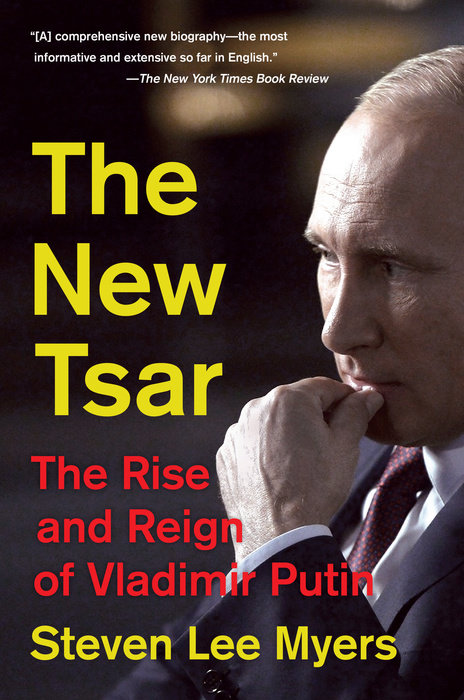
The New Tsar
The Rise and Reign of Vladimir Putin
کتاب های مرتبط
- اطلاعات
- نقد و بررسی
- دیدگاه کاربران
نقد و بررسی

July 13, 2015
New York Times reporter Myers has written a timely, richly detailed, if too narrowly focused biography of Vladimir Putin. Putin, a KGB operative, cannily decided to leave the agency during the Soviet collapse in 1991. He ascended to power nine years later, and now controls the vast Russian Federation as tightly as a czar. As the book reveals, his authoritarian, highly nationalistic style and assertive foreign policy are directed toward rebuilding Russian power in Eastern Europe and the Middle East, not reestablishing Soviet ideology. Myers emphasizes the suppression of internal dissent, which includes the Pussy Riot arrests and—many theorize—whistle-blower Alexander Litvinenko’s poisoning. The narrative also covers Putin’s moves against the country’s oligarchs, such as the imprisonment of oil tycoon Mikhail Khodorkovsky and expropriation of his company, Yukos. Myers concludes with Russia’s 2014 annexation of Crimea. His book appears as tensions between the West and Russia are rapidly rising, involving areas from the Baltic to the Ukraine and escalating to threats of nuclear force. Myers provides little historical context to explain Putin’s appeal and the broader Russian disposition. His inside-baseball account, often focused on little-known personalities and behind-the-scenes political machinations, will intrigue readers but leave them with only a shadowy picture of this enigmatic modern-day “tsar.” Agent: Larry Weissman, Larry Weissman Literary.

Starred review from July 15, 2015
The reptilian, poker-faced former KGB agent, now Russian president seemingly for life, earns a fair, engaging treatment in the hands of New York Times journalist Myers. The author was based in Russia for some years during Vladimir Putin's rise to power, and he clearly knows his material and primary subject, which is very important in the tracking of this slippery conniver, who was in a good place to take power at President Boris Yeltsin's decline in 1999. A curious, coldblooded opportunist, the spy who came in from the cold by hitching his star first to prominent politician Anatoly Sobchak, a leader of the democratic movement in the 1990s, Putin used the perks of power to create a complex system of cronyism and nepotism. Myers shows how Putin convinced everyone that this way of operating was part of the Russian soul and how he perpetuated it through an archaic form of Russian corruption-e.g., profiting from deals and then offering disingenuous explanations. When the civil war in Chechnya erupted, Putin's strong-arm tactics and hard-line stance against terrorism swung popular opinion. "This is not just about restoring Russia's honor and dignity," he said. "It's about putting an end to the breakup of the Russian Federation." This was Putin's successful mantra for surviving at the top, from 2000 to the present, in successive presidential runs that were frankly illegal. He took over the TV channels for the state's purposes, consolidated gas and petroleum companies into enormously powerful monopolies, put a recalcitrant military firmly under his command, and convinced the world that Russia could hold the 2014 Winter Olympics at Sochi, which became his pet project. Myers astutely notes how Putin's speeches increasingly harkened back to the worst period of the Cold War era's dictates by Soviet strongmen. The author ends with the haunting lyrics from a Great Patriotic War of 1953 song that was conveniently used for the appropriation of the Crimea. A highly effective portrait of a frighteningly powerful autocrat.
COPYRIGHT(2015) Kirkus Reviews, ALL RIGHTS RESERVED.

September 1, 2015
This new entry into the ever-growing repertoire of works on Vladimir Putin (b. 1952) is a clear, readable, and detailed study of the leader's political life, illustrated throughout with intimate facts and anecdotes. Former New York Times journalist Myers draws upon publications both international and from within Russia, and utilizes his experience reporting on issues related to Russian politics and foreign affairs as he follows the famously inscrutable Russian ruler from his humble origins to his current presidency. Tracing the development of relationships between Putin and those he trusts, Myers examines how Putin's rise demonstrated his ability to capitalize on advantages, and how his personal loyalties defined his world-view. The author's political analysis places this account in a contextual rather than argumentative framework, reviewing Putin's life in terms of the greater Russian narrative of the post-Soviet era. VERDICT Accessible, well-researched, and comprehensive, this political biography of a powerful and enigmatic global leader will be intriguing to anyone following current events or interested in the ongoing development of Russian politics and culture. [See Prepub Alert, 4/20/15.]--Elizabeth Zeitz, Otterbein Univ. Lib., Westerville, OH
Copyright 2015 Library Journal, LLC Used with permission.

September 1, 2015
It has now dawned on most American and European politicians that a newly and sometimes dangerously assertive Russia under Vladimir Putin is not a partner. The most obvious example of Russian expansionist desires is, of course, in Ukraine. There is also the constant drumbeat in official and state-controlled media whipping up Russian nationalism and opposition to Western hegemony. So it is essential for Americans and Europeans to understand Putin, who may wield more personal power than any Russian leader since Stalin. Myers is the former Moscow bureau chief and has tracked Putin's career for many years. On a geopolitical level, Myers asserts that Putin's worldview is strongly shaped by the sense that Russia, with its immense size, Orthodox tradition, and unique history, is different and should continue to be different than other European nation-states. Putin also embraces a traditional Russian attitude toward the West that includes both envy and suspicion. On a personal level, Myers views Putin as manipulative and power hungry but also capable of connecting with the aspirations and fears of ordinary Russians. This is an important and well-done effort to explain a leader whom we must reckon with for the foreseeable future.(Reprinted with permission of Booklist, copyright 2015, American Library Association.)

























دیدگاه کاربران